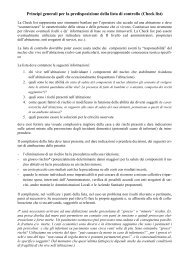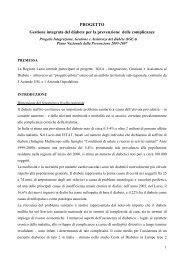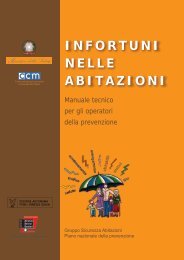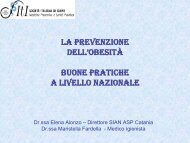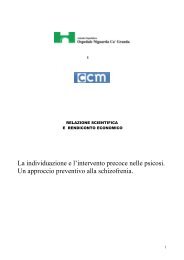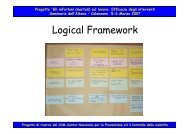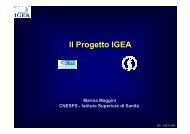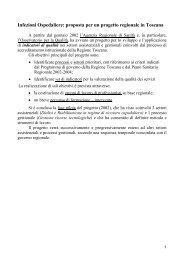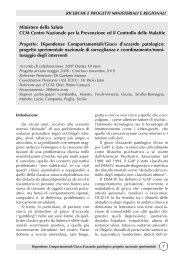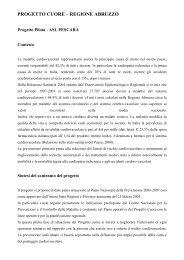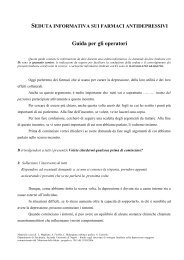Gaining health : analysis of policy development in European ...
Gaining health : analysis of policy development in European ...
Gaining health : analysis of policy development in European ...
You also want an ePaper? Increase the reach of your titles
YUMPU automatically turns print PDFs into web optimized ePapers that Google loves.
tion <strong>of</strong> mak<strong>in</strong>g the reason<strong>in</strong>g more mean<strong>in</strong>gful to other actors<br />
<strong>in</strong>volved.<br />
The 1991 report <strong>of</strong> an external WHO review group (11)<br />
several times mentions <strong>in</strong>adequate participation by the<br />
public and actors <strong>in</strong> other sectors that would need to<br />
implement the strategy. This was hardly surpris<strong>in</strong>g, s<strong>in</strong>ce<br />
there were no models from which to learn, F<strong>in</strong>land be<strong>in</strong>g<br />
the first test case <strong>in</strong> Europe. No additional resources had<br />
been designated for <strong>policy</strong> formulation, coord<strong>in</strong>ation or<br />
monitor<strong>in</strong>g <strong>of</strong> implementation. “A lot <strong>of</strong> normal advisory<br />
boards and expert groups were used, some necessary<br />
special research was commissioned, but no extra budget<br />
or work-time allocated” (5). Follow<strong>in</strong>g the parliamentary<br />
discussion, which considerably raised awareness, the energy<br />
<strong>of</strong> heavily pressed government <strong>of</strong>ficials was spent <strong>in</strong> draft<strong>in</strong>g<br />
the implementation strategy rather than work<strong>in</strong>g with<br />
stakeholders, “<strong>in</strong> paper work and not people work” (5).<br />
It was realized early <strong>in</strong> the process that some <strong>of</strong> the momentum<br />
had been lost and, <strong>in</strong> order to revitalize efforts, it<br />
was decided to attempt an <strong>in</strong>ternal revision <strong>of</strong> the strategy<br />
parallel with a review by external (WHO) experts. In June<br />
1991, a broad-based and high-powered Steer<strong>in</strong>g Committee<br />
was set up for the implementation and follow-up <strong>of</strong> the<br />
Health for All 2000 programme (9). Apart from representatives<br />
<strong>of</strong> MSAH, the Committee <strong>in</strong>cluded representatives<br />
<strong>of</strong> the m<strong>in</strong>istries responsible for education, agriculture,<br />
trade and <strong>in</strong>dustry, transport and the environment; <strong>of</strong><br />
organizations with responsibilities for welfare, public <strong>health</strong><br />
and <strong>health</strong> education; and <strong>of</strong> cities, rural communities,<br />
academia and the <strong>health</strong> pr<strong>of</strong>essions. Their mandate was<br />
to assess progress <strong>in</strong> implementation <strong>of</strong> the Health for All<br />
2000 strategy and to make provision for its revision and for<br />
better coord<strong>in</strong>ation <strong>of</strong> the activities <strong>of</strong> different sectors <strong>in</strong><br />
achiev<strong>in</strong>g its objectives.<br />
The revised strategy (18) took clear note <strong>of</strong> the WHO review<br />
group’s criticisms and provided for closer collaboration<br />
between municipalities and NGOs, for better participation<br />
<strong>of</strong> the public on adm<strong>in</strong>istrative bodies and for tra<strong>in</strong><strong>in</strong>g to<br />
improve such <strong>in</strong>teraction. It is <strong>in</strong>terest<strong>in</strong>g to note that, follow<strong>in</strong>g<br />
a request <strong>of</strong> the external review group to <strong>in</strong>terview<br />
<strong>health</strong> pr<strong>of</strong>essionals, the nurs<strong>in</strong>g pr<strong>of</strong>ession was thereafter<br />
represented on <strong>health</strong> plann<strong>in</strong>g bodies. Their exclusion up<br />
to then had not been <strong>in</strong>tentional: <strong>in</strong> the absence <strong>of</strong> a stakeholders’<br />
<strong>analysis</strong>, they were simply overlooked.<br />
The whole process cont<strong>in</strong>ued to be heavily expert-led, as<br />
was the accepted way <strong>of</strong> work<strong>in</strong>g. Indeed, members <strong>of</strong> the<br />
WHO external review group, who came from different<br />
parts <strong>of</strong> Europe, had been impressed by the apparent public<br />
trust <strong>of</strong> and confidence placed <strong>in</strong> experts and civil servants<br />
<strong>in</strong> F<strong>in</strong>land.<br />
In 1997, an Advisory Board for Public Health was set up<br />
by the Council <strong>of</strong> State to renew the Health for All <strong>policy</strong>.<br />
The Board was chaired by the Permanent Secretary <strong>of</strong><br />
MSAH and <strong>in</strong>cluded representatives from various m<strong>in</strong>istries,<br />
regional <strong>health</strong> care adm<strong>in</strong>istrations, research <strong>in</strong>stitutions,<br />
NGOs and <strong>health</strong> pr<strong>of</strong>essionals’ associations.<br />
The Board published reports on <strong>in</strong>equities <strong>in</strong> <strong>health</strong> and the<br />
life-cycle approach to <strong>health</strong> promotion. A series <strong>of</strong> sem<strong>in</strong>ars<br />
was organized with very broad participation, lead<strong>in</strong>g to<br />
the draft<strong>in</strong>g <strong>of</strong> a consultation document (Health 2015); this<br />
was sent out for comments at the end <strong>of</strong> 1999 and adopted<br />
by the Council <strong>of</strong> State <strong>in</strong> 2001.<br />
Perhaps surpris<strong>in</strong>gly, given the <strong>in</strong>tention <strong>of</strong> work<strong>in</strong>g across<br />
sectors, only MSAH was given explicit responsibilities <strong>in</strong> the<br />
document, with little detail on what other sectors might do.<br />
2.1.3. Values and pr<strong>in</strong>ciples<br />
F<strong>in</strong>land’s <strong>health</strong> and social <strong>policy</strong> is clearly founded on the<br />
Nordic welfare model, <strong>in</strong>fluenced by a sense <strong>of</strong> cohesion, a<br />
common (protestant) ethic and a very high value placed on<br />
education. The central features <strong>of</strong> this model (19) are:<br />
Chapter 4<br />
43<br />
Case studies: <strong>policy</strong> <strong>development</strong> <strong>in</strong> countries for tackl<strong>in</strong>g noncommunicable diseases



